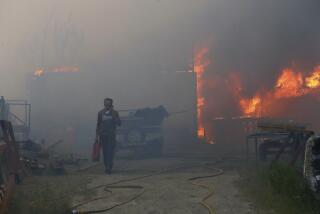Europe’s Deadly Heat Wave Leaves Vacationers Wilting
- Share via
MADRID — Summer vacation felt more like an inferno than an idyll in Europe on Wednesday as a killer heat wave stoked wildfires across the south and brought record-high temperatures as far north as Britain.
At least 28 deaths have been blamed on punishing heat that descended on the region last week as millions of Europeans started their traditional August-long holidays.
The worst-hit country is Portugal, where brush fires have struck 15 of the nation’s 18 districts. The death toll from the fires climbed to at least 14 Wednesday when authorities found the corpses of a married couple in a charred forest near Braganca in northeastern Portugal, where firefighters battled to contain four vast wildfires.
The Portuguese government has declared a national state of emergency and asked the North Atlantic Treaty Organization and neighboring countries for extra aircraft and other firefighting equipment. But some nations have been hard-pressed to respond because they’re dealing with fires of their own.
In Spain, meanwhile, officials said Wednesday that 14 people had died in the heat wave, which has pushed temperatures as high as 106 degrees in the southern regions of Andalusia and Extremadura. Many of the victims were elderly or infirm.
In one case, the bodies of a couple in their 80s were found in an apartment in Seville on Monday. Police suspect that the husband died of heatstroke and that his wife, who suffered from Alzheimer’s disease and other ailments, died because she was deprived of the medication that her husband usually administered, according to press reports Wednesday.
Firefighters in Spain have largely controlled brush fires that consumed an estimated 64,800 acres in the first five days of August, according to the Environment Ministry. Smaller fires have caused destruction and evacuations in France, Italy, Greece and Croatia.
And the weather Wednesday staggered capitals such as London, which recorded its hottest day in history with a temperature of 95.7, and Paris, where the 103-degree temperature was just short of a record.
British police reported two incidents in which teenage swimmers drowned while seeking relief from the heat -- one in a canal in Yorkshire and the other in a lake in Hampshire. And Italian press reports said deaths in Genoa and Venice may have been caused by stifling temperatures.
Elsewhere, the Danube River dropped to direly low levels in Germany, British trains reduced speed in response to fears of buckled tracks, and French department stores sold out of air conditioners.
Although hardly anyone likes to work in Europe in August, the summer has brought little rest for weary installers of air conditioners in France. The sweatiest summer in decades is helping the French overcome a longtime cultural resistance to the joys of indoor climate control.
“Our members haven’t stopped working for three months,” said Nicolas Gouye, head of Climsure, an association of merchants who sell air-conditioning units.
Northern France, Britain and Germany are generally unprepared for brutal and sustained heat. With subways and buses transformed into rolling ovens, authorities in London urged commuters to carry water with them and speak up if they felt sick or faint.
Officials at Berlin’s City Hall, showing a decidedly limited tolerance for the heat, announced that workers could go home if the temperature passed 84 degrees.
Farther south, city halls and hoteliers on the French Riviera were trying to recover from the toll of fires last month that killed four people, blackened scenic landscapes and forced the evacuation of vacationers from campgrounds to makeshift shelters in gymnasiums. The flames have been largely extinguished, but the damage lingers.
Michel Tschann, president of the hotel owners association in Nice, said in an interview with Agence France-Presse: “I’ve had to send 1,500 messages with explanations because we are getting crazed calls from tour operators who don’t want to send clients into a furnace.”
Times staff writers Petra Falkenberg and Christian Retzlaff in Berlin, Achrene Sicakyuz in Paris, Janet Stobart in London and special correspondents Nancy Meiman in Rome and Cristina Mateo Yanguas in Madrid contributed to this report.
More to Read
Sign up for Essential California
The most important California stories and recommendations in your inbox every morning.
You may occasionally receive promotional content from the Los Angeles Times.










